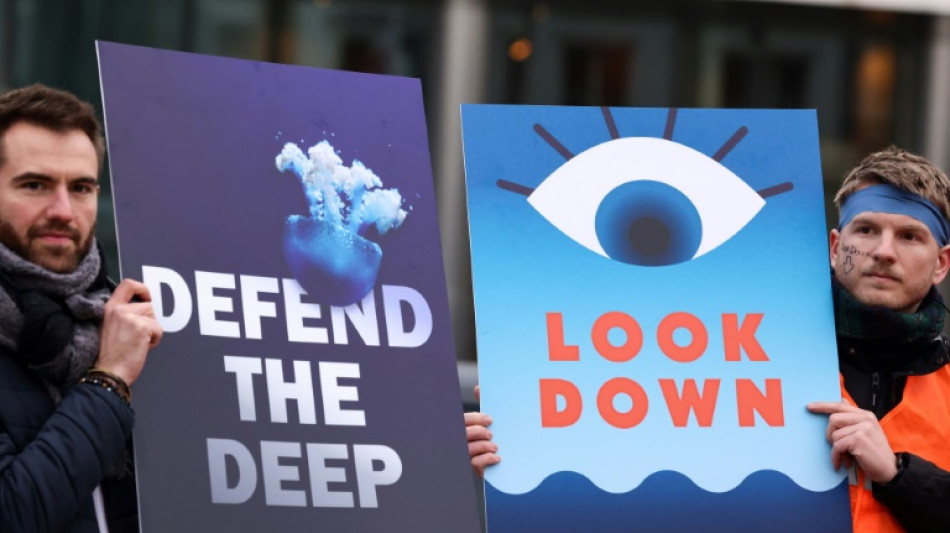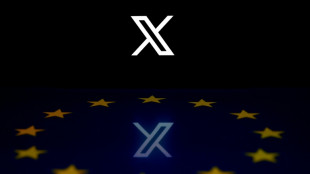
-
 US military assets in the Middle East
US military assets in the Middle East
-
Neymar hints at possible retirement after World Cup

-
 Stocks rise after court ruling against US tariffs
Stocks rise after court ruling against US tariffs
-
Australia end dismal T20 World Cup by thrashing Oman

-
 Olympics chief says Milan-Cortina has set new path for Games
Olympics chief says Milan-Cortina has set new path for Games
-
Russian SVR spy agency took over Wagner 'influence' ops in Africa: report

-
 Pegula fights back to sink Anisimova and reach Dubai final
Pegula fights back to sink Anisimova and reach Dubai final
-
Trump administration denounces 'terrorism' in France after activist's killing

-
 Colombia's Medellin builds mega-prison inspired by El Salvador's CECOT
Colombia's Medellin builds mega-prison inspired by El Salvador's CECOT
-
German broadcaster recalls correspondent over AI-generated images

-
 US Supreme Court strikes down swath of Trump global tariffs
US Supreme Court strikes down swath of Trump global tariffs
-
England's Itoje says managing 'emotional turmoil' key to 100 cap landmark

-
 Trump says weighing strike on Iran as Tehran says draft deal coming soon
Trump says weighing strike on Iran as Tehran says draft deal coming soon
-
Tudor is '100 percent' certain of saving Spurs from relegation

-
 Azam dropped for scoring too slowly, says Pakistan coach Hesson
Azam dropped for scoring too slowly, says Pakistan coach Hesson
-
Stocks volatile after soft US growth data, court ruling against tariffs

-
 Italy bring back Capuozzo for France Six Nations trip
Italy bring back Capuozzo for France Six Nations trip
-
From Malinin's collapse to Liu's triumph: Top Olympic figure skating moments

-
 Arteta urges Arsenal to 'write own destiny' after title wobble
Arteta urges Arsenal to 'write own destiny' after title wobble
-
Ukraine Paralympics team to boycott opening ceremony over Russian flag decision

-
 Wales captain Lake wants fans to bring 'noise' against Scotland
Wales captain Lake wants fans to bring 'noise' against Scotland
-
Skier Vonn's Italian hospital a hotbed of men, sister says

-
 India target S.Africa top order, Abhishek to come good: bowling coach
India target S.Africa top order, Abhishek to come good: bowling coach
-
Carrick praises Man Utd 'diversity' after Ratcliffe's immigrant rant

-
 I never thought it would be hit, says 'Scream' creator 30 years later
I never thought it would be hit, says 'Scream' creator 30 years later
-
AI summit statement delayed to 'maximise' signatories: India

-
 Barcelona's Sagrada Familia basilica hits peak height
Barcelona's Sagrada Familia basilica hits peak height
-
Milan sprints to second straight UAE stage win as Tiberi keeps lead

-
 US GDP growth misses expectations as Trump blames shutdown
US GDP growth misses expectations as Trump blames shutdown
-
Benfica investigate video of fans' monkey gestures

-
 French minister pledges tight security at rally for killed activist
French minister pledges tight security at rally for killed activist
-
Guardiola 'couldn't care less' about Arsenal stumble in title race

-
 UK police search property as royals reel from Andrew's arrest
UK police search property as royals reel from Andrew's arrest
-
Germany's Merz to visit China next week

-
 Kompany says Mourinho made 'huge mistake' in Vinicius racism row
Kompany says Mourinho made 'huge mistake' in Vinicius racism row
-
X appeals EU's 120-mn-euro fine over digital content violations

-
 Galthie recalls hulking locks Flament, Meafou for Italy
Galthie recalls hulking locks Flament, Meafou for Italy
-
Turkey, Saudi sign major solar power deal

-
 US Olympic freeskier Hess embraces 'loser' tag after Trump blast
US Olympic freeskier Hess embraces 'loser' tag after Trump blast
-
European stocks rebound, oil prices ease after US-Iran volatility

-
 'Alpha male' AI world shuts out women: computing prof Hall
'Alpha male' AI world shuts out women: computing prof Hall
-
New Zealand freestyle skier Ives in hard Olympic crash

-
 New Zealand must adapt quickly to Sri Lanka wickets: Chapman
New Zealand must adapt quickly to Sri Lanka wickets: Chapman
-
Thai activist's jail term for royal insult extended to 30 years

-
 Families of Duterte's drug war victims eye Hague hearing with hope
Families of Duterte's drug war victims eye Hague hearing with hope
-
India chases 'DeepSeek moment' with homegrown AI

-
 UN touts panel for 'human control' of AI at global summit
UN touts panel for 'human control' of AI at global summit
-
Ukraine Paralympics team to boycott Opening Ceremony over Russian flag decision: statement

-
 UK monarchy reels from Andrew's stunning arrest
UK monarchy reels from Andrew's stunning arrest
-
Somaliland, where Muslims love Israel


Take 'precautionary approach' on deep-sea mining: top official tells AFP
Rules for the emerging deep-sea mining sector should take a "precautionary approach" that protects the environment, the head of the body drafting regulations for the practice told AFP Friday.
At stake is a potential new frontier for developing mineral resources like nickel, cobalt and copper that are crucial for renewable energy technology.
But researchers and environmentalists have long warned it risks destroying habitats and species that are little understood, and could upset delicate ocean processes that affect climate change.
Regulating the industry is the responsibility of the International Seabed Authority (ISA), an independent body established under a UN convention.
Its Council aims to adopt a code this year, after more than a decade of work.
In an interview with AFP, ISA Secretary-General Leticia Carvalho said there was "no rush or delay" on finalising the rules, and urged an approach that prioritises the environment.
"We are developing regulations for an entirely new industry," said Carvalho, who took the top job this year.
"A key principle in this regard is the precautionary approach, which will help us navigate the sustainable use and management of deep-sea mineral resources."
- Divisive issue -
The world paid little attention when the ISA, created in 1994, quietly began negotiating the mining code.
But the effort has taken on new urgency.
Since July 2023, due to a legal clause invoked by the tiny Pacific island nation of Nauru, any country can apply for a mining contract in the name of a company it sponsors.
Nauru Ocean Resources Inc., a subsidiary of Canada's The Metals Company (TMC), wants to begin mining polymetallic nodules in the Pacific as soon as 2026.
It plans to file an exploitation application in June, making the need for a code governing mining all the more pressing.
Carvalho has stressed that rebuilding trust is a priority for her tenure, after her predecessor was accused of favouring mining interests and even misusing funds -- allegations the ISA Secretariat denied.
An oceanographer by training, Carvalho can only guide member states as they decide whether and how to draft a code.
The ISA's Council is deeply divided, with some member states keen to see mining start soon, and others backing a moratorium or even outright ban on seabed exploitation.
Carvalho has projected a scrupulously neutral image on the issue, emphasising the need for science-based decision-making, and equitable sharing of any profits from resources often dubbed a "common heritage of mankind."
"Without a Mining Code, the legal framework for deep-seabed mining in the Area (international seabed) would be incomplete," she said in written answers.
That could open the door to significant legal uncertainty if mining applications are filed without a code.
- 'Realm of wonder' -
Concerns about the impact of mining gained strength with the discovery last year that oxygen was being released on the ocean floor not just by living organisms, but by polymetallic nodules that would be targeted by companies.
The findings have been rejected by the TMC, even though it helped fund the research, and follow-up work is ongoing.
Mining proponents point to the growing need for minerals to drive the renewable energy transition, and the problems associated with on-land exploitation -- including environmental degradation and rights abuses.
Carvalho noted that the "dark oxygen" findings have not yet been replicated, and are the subject of debate.
And she pointed out "common misconceptions" about the prospect of deep-sea mining, including about its proposed scale, as well as what deep-sea ecosystems look like.
"Roughly 0.13 percent of the world's seabed — about 478,000 kilometres squared — could eventually be mined, a relatively small fraction compared to the vastness of the ocean floor," she said.
And while scientists are still learning about life on the seafloor, deep-sea ecosystems "tend to have lower population densities and function under vastly different environmental conditions," Carvalho said.
While running for the job last year, the Brazilian scientist emphasised her background in developing industry regulations, as well as her personal connection to the sea.
"The ocean has always been a fundamental part of who I am," she said.
It is "a realm of wonder and vast opportunities that must be responsibly managed."
M.Fischer--AMWN


